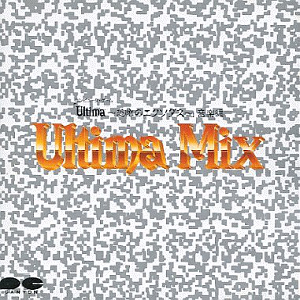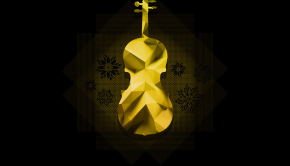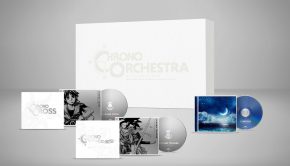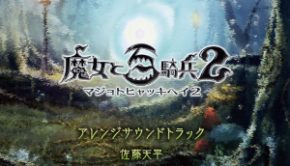Ultima Mix
 |
Album Title: Ultima Mix |
| Record Label: Canyon Records |
|
| Catalog No.: D32G-0063 (CD); C28P-6714 (Tape); C28G-0478 (Vinyl) |
|
| Release Date: September 5, 1987; July 21, 1987; July 21, 1987 |
|
| Purchase: Buy Used Copy |
Overview
While the Ultima series of computer games is one of the founding stones of the computer RPG genre and among the most influential game franchises in history, its second part Ultima II: The Revenge of the Enchantress was an uneven outing. However, the series hit its stride again with Ultima III: Exodus, released in 1983. More mature and developed than previous Ultima games, Exodus‘ features like its overhead view, separate battlefield screen and explorable overworld made it a direct inspiration for games like Dragon Quest and Final Fantasy, which of course in turn became hugely influential in themselves. From Ultima III: Exodus onwards, the Ultima series itself would go from strength to strength to culminate in Ultima VII: The Black Gate.
Following its success, Ultima III: Exodus was ported to numerous game systems, including the NES – four years after the game’s original release and simply titled Exodus. The passing of time and the arrival of improved hardware allowed for several technical updates, including better graphics. Another area in which Exodus improved upon its original release was its soundtrack. Kenneth W. Arnold had written just over 5 minutes of music for Ultima III: Exodus – the first Ultima game to actually contain music in its original release on home computers. For the NES port, Tsugutoshi Goto was brought in to compose a new score that clocked in at about 10 minutes and represented a significant update in quality over the original score, turning out to be the best soundtrack of the three NES Ultima ports (the later ports were Ultima IV: Quest of the Avatar and Ultima V: Warriors of Destiny, which infamously played the same short and grating tune throughout pretty much the whole game). While Exodus was Goto’s first video game score, he had already gathered more than 15 years of experience as a professional musician in the Japanese rock and pop music scene, having played in several bands and composing and arranging songs for a variety of artists.
This artistic background put Goto in a strong position when it came to re-shaping Exodus‘ music for an arrange album called Ultima Mix that would expand the game’s original 10 minutes of music across a 40-minute album. Two tracks on the album turned the source material into fully-fledged pop songs sung by Noriko Hidaka, who’s best known for her voice acting in numerous high-profile anime features and series. Ultima Mix hit the shelves in mid-1987 on CD, vinyl and cassette, while the album’s two songs were also released separately on a 7-inch EP called Ultima -Hitomi no Knife-. On a sidenote: while some websites credit Kenneth W. Arnold for Ultima Mix, his material features neither on the arrange album nor on Goto’s original NES score – otherwise, this album could probably make a valid claim for being one of the first commercial Western game music albums.
Body
Stretching a brief soundtrack like Exodus into a full-length album is no easy feat, but interestingly enough, Goto’s best arrangements are those have to work with the flimsiest original material, such as “The Underground Labyrinth”. Originally a simple, constant arpeggio run finished off with a brief danger motif, Goto does his best to overcompensate and goes all out when he arranges layers and layers of synthetic instrumental flourishes around the source material. On “The Underground Labyrinth”, Goto manages to maintain the eerieness of the original composition, while cleverly elaborating upon it and turning the piece into a curious exercise in genre-bending. A wall of clanging, wild sound effects backs a stomping, catchy 80s synth drum kit rhythm that dominates the track. Meanwhile, the music constantly veers back and forth between the arpeggio figure – which is now used to actually build tension – and staccato interruptions derived from the danger motif. It’s a peculiar, but well-planned and well-executed clash of elements that is undeniably cheesy, but also entertainingly unpredictable: “The Underground Labyrinth” and other tracks on Ultima Mix play like a synth-laden horror movie soundtrack with stadium rock ambitions; on other occasions, these cues are slightly eccentric Goth rock takes on 80s dance beats.
“Exodus the Terrible” continues in a similar vein to “The Underground Labyrinth” – even though it’s not quite as creative in its development – and is further proof that Ultima Mix is at its most entertaining when Goto thinks big and powers his arrangements through booming 80s beats and masses of sound effects. On “Exodus the Terrible”, Goto backs the head-nodding synth melody with layers of semi-creepy sounds to preserve the original track’s ominous yet determined mood, while the anthemic drum kit beat translates the NES cue’s rather feeble pulse into a noisy force to be reckoned with. Another, more creative improvement that “Exodus the Terrible” makes on its source material is how Goto takes the original’s opening, gloomy-but-pale chord progression and turns it into a bright clarion call that gives the piece its instantly effective melodic hook. “More is better” is the motto that Goto also applies to “Holy War”, originally simply a row of stop-start staccato motifs and overall a less than convincing battle theme. In his arrangement, Goto again makes good use of the higher-quality synths at his disposal, giving the track a much fuller sound, while the addition of a gritty electric guitar solo adds a sense of forceful aggression that takes the short track to a sweeping finale.
None of these tracks will leave listeners in any doubt whatsoever about from which era this album originates. Ultima Mix is undeniably a child of the 1980s – the album production gives all tracks a glossy, shiny finish that further accentuates the music’s almost completely synthesised instrumentation. While this particular sound won’t be to everybody’s liking, it’s hardly inappropriate, given that these are arrangements of music that already came in synthesised form via the NES sound chip. Another relict of 80s music production trends yields more varied results: Goto often applies tons of echo to the tracks. In combination with the album’s often near-Gothic nature, this trait makes the above compositions sound as if they’re being performed in a vast cave. Obviously, this ties in nicely with the fact that these cues are underscoring underground dungeons or creepy castles. However, on other tracks, the same effect feels misplaced. “The Heroes’ Journey”, the game’s overland theme, paradoxically sounds as claustrophobic as “Underground Labyrinth”, due to the same catchy, but boxy 80s synth beats. Once you look past this strange disconnect between the arrangement and the location that is scores, the cue is still a solid re-working of the original piece, particularly in how the arrangement improves on the source material’s melodically thin B section by – again – adding thumping synth percussion to the mix.
Other tracks are even more liberal in their re-shaping of the original cues, but to decidedly lesser results. Indeed, some of Goto’s choices feel downright odd – case in point, the album’s two ballads, which unfortunately are also Ultima Mix‘ least convincing bits. In its original NES format, the music for Lord British’s castle closely follows the ‘castle music’ model laid out by Koichi Sugiyama’s Dragon Quest scores: a Baroque-inspired piece with the feel of a minuet to bring across the necessary sense of regal grandeur. Goto’s lively, yet appropriately stately piece is an enjoyable creation, but his treatment of it on Ultima Mix is curious. Firstly, Goto arranges the castle music into “The Magnet of the Heart”, a saccharine, sappy J-Pop ballad that doesn’t have much to do with the NES piece. “The Magnet of the Heart” is performed competently by Noriko Hidaka, but the appeal of her sickly sweet (to this reviewer’s ears) performance will be divisive. Granted, she’s not given much to work with: the verses see her singing a slow version of the original piece’s sprightly melody, and the new tempo diminishes the tune’s appeal immensely. The chorus features a better melodic hook than the verses, but that merit is only relative.
The second track derived from Lord British’s castle music is “The Eternal Castle Britannia”, which plays a bit like a non-vocal version of “The Magnet of the Heart” – a tinkling, silvery melody lead plays against a simple pop rhythm, in a rendition that’s as nourishing as a ball of fairy floss. At least “The Eternal Castle Britannia” is somewhat more evocative than “The Magnet of the Heart”, with bits of it sounding as if they’re scoring a crystal cave. But that slight positive is torpedoed effectively by Goto’s most puzzling artistic decision on Ultima Mix: covering the music in sound effects of still cameras taking pictures. “Ultima -Hitomi no Knife-”, Ultima Mix‘ second song arrangement, closes the album on an equally disappointing note – while the track is more upbeat than “The Magnet of the Heart”, it lacks memorable features just as much and plays like a cloying slice of uninspired synth pop, whose perkiness becomes grating pretty soon. Again, the melodic material is derived from the track’s original NES version, but it’s barely recognisable and doesn’t work particularly well in the new stylistic environment. What’s worse, in its original form, the cue was the NES soundtrack’s most ambitious and longest composition, aiming for a classical flair that it mostly achieved. These traits make it a perplexing choice for a pop song arrangement though, particularly given that a peppy track like “Voyage to the Unknown” would have been a far more obvious and suitable choice.
Speaking of “Voyage to the Unknown”, its version on Ultima Mix is one of the arrangements that stays fairly close to its original form. Easily the bounciest cue on the NES soundtrack, “Voyage to the Unknown” somewhat predictably translates into a poppy arrangement sprinkled with 80s synth glitter. The fluffy result plays like something you would have heard in a shopping mall around Christmas 1987. Once the melody is given to the synth trumpets, the effect changes to one of background muzak fit for a holiday cruise ship travelling the Caribbean. Either way, the track’s relentlessly upbeat nature becomes tiresome after a while. “The Return of the Champions”, Exodus‘ celebratory ending track, is equally built on dated, cheesy 80s synths, but of a much more delicious kind. The original track’s cheery, proud melodies are the NES soundtrack’s most memorable moment, and Goto doesn’t have to do much more than just take the melodies and give them the anthemic synth pop treatment that he’s bestowed upon Ultima Mix‘ other standout tracks as well. Not even the frequent repetition of the cue’s two melodies can harm its catchy charm, and Goto arguably provides some timbral balance by inserting a number of harsher, guitar-driven episodes. All in all, this is music that would be perfectly suited for the closing credits of any Top Gun-style movie and simply loads of fun.
The other two arrangements on Ultima Mix that stay quite faithful to their roots are “The Enigma of Ambrosia” and “A Peaceful Town”. The latter piece is similar to Lord British’s castle music in its adherence to JRPG score conventions: a soothing melody with Baroque inspirations welcomes the gamer in this safe haven, away from the beast-riddled overworld. Goto’s arrangement takes the original track’s strong melody at face value and hands it to the strings, while carefully adding some counterpoint. It is a pretty straightforward arrangement and the glossy, cold synth strings are at odds with the melody’s inherent warmth, but the track persists simply on the attractive nature of its melodic material. “The Enigma of Ambrosia” was the original score’s most fascinating track, embellishing its peaceful nature with a haunting undercurrent of mystery, best embodied through the clever accompaniment of its lead melody that changed back and forth between providing harmonic support and melodic counterpoint. The arrangement is only too happy to pick up the original composition’s intriguing air and appropriately adds a female synth choir to underscore the music’s ethereal nature. However, Goto fails to capture the NES track’s otherworldly appeal and only comes up with a sequence of strange sounding string tremolo effects that make the instruments sound as if they’re played underwater. While it doesn’t realise its full potential though, “The Enigma of Ambrosia” still remains a dutifully atmospheric cue.
Summary
Not surprisingly, Ultima Mix is a bit all over the place, both stylistically and quality-wise. Drenched in an unmistakably 80s sound that most of the time sounds endearingly retro enough, Goto’s arrangements of his own creations work best when he takes the previously meager source material and compensates by rendering it via booming 80s synth beats and catchy melodies, set against cascading walls of ominous sound effects and the occasional roaring electric guitar. The resulting Goth disco-meets-stadium rock mix is more about style than substance, but Goto’s treatment of the source material manages to be both creative and faithful to the originals. When combining the source material with genuinely strong melodic material like on “The Return of the Champions”, Goto lands an easy winner.
Other tracks more closely modelled on their original versions are less remarkable, but still sufficiently endearing. What marrs the album are its excursions into trite, saccharine J-Pop on the album’s two ballads,which are especially unfortunate because they discard all potential that their source material holds. Another couple of more pop-oriented arrangements is either inconsequential (“Voyage to the Unknown”) or puzzling (“The Eternal Castle Britannia”). This leaves Ultima Mix inconsistent and more of a curiosity than an easily recommended purchase, but curious collectors who don’t mind nostalgic sounds with a creative bend could certainly do worse than this album.
Do you agree with the review and score? Let us know in the comments below!
3
Posted on August 1, 2015 by Simon Elchlepp. Last modified on August 1, 2015.















Interesting review. Had no idea that this was a) a Japanese production and b) a fully-fledged arranged album until now. Thought it was something super crappy like the Warcraft mixes. Sorry it didn’t get published until now!